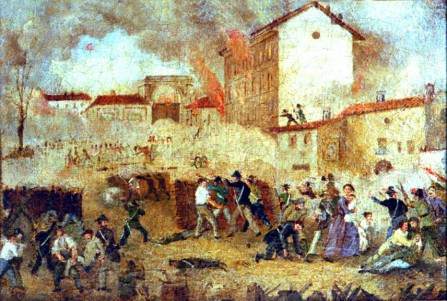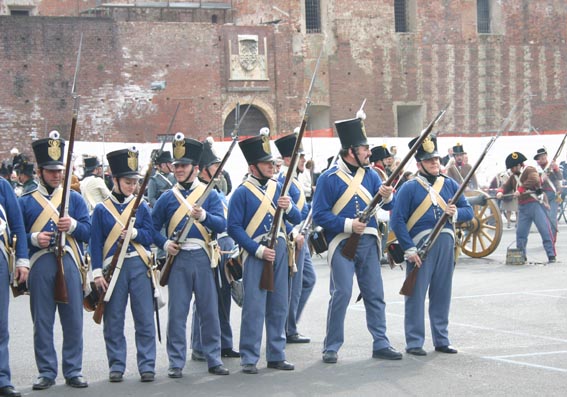Above is the palace you can nearly touch. By the way try another Pizzeria (Pizza is very good though if you can wait an hour to get serve while the sundry cretins who are supposed to be waiters eye girls and ignore you) .the waiters suck like most of Italian eateries.But back to basics.........
The Neapolitans had got their liberties, but they soon found themselves face to face with perplexities which would have taxed the powers of men both wiser and more experienced in free government than they were.
In the first place, although a revolution may be made by a sect, a government cannot be carried on by one. The Carbonari who had won the day were blind to this self-evident truth; and, to make matters worse, there was a split in their party, some of them being disposed to throw off the Bourbon yoke altogether; a natural desire, but as it was only felt by a minority, it added to the general confusion. Then came, as it was sure to come, the cry for separation from Sicily.
The Sicilians wanted back the violated constitution obtained for them by the English in 1812, and would have nothing to do with that offered them from Naples.
In every one of the struggles between Sicily and Naples, it is impossible to refuse sympathy to the islanders, who, in the pride of their splendid independent history, deemed themselves the victims of an inferior race; but it is equally impossible to ignore that, politically, they were in the wrong.
In union, and in union alone, lay the only chance of resisting the international plot to keep the South Italian populations in perpetual bondage.
The Sicilian revolt was put down at first mildly, and finally, as mildness had no effect, with the usual violence by the Neapolitan Constitutional Government, which could not avoid losing credit and popularity in the operation.
Meanwhile, the three persons who traded under the name of Europe met at Troppau, and came readily to the conclusion that 'the sovereigns of the Holy Alliance exercised an incontestable right in taking common measures of security against states which the overthrow of authority by revolt placed in a hostile attitude towards every legitimate government.' The assumption was too broadly stated, even for Lord Castlereagh's acceptance; but he was contented to make a gentle protest, which he further nullified by allowing that, in the present case, intervention was very likely justified.
France expressed no disapproval. Only the Netherlands, Switzerland, Sweden and Spain gave the Constitutional régime tacit support by recognising it.
The Emperor of Russia was very anxious to take part in the business, and would have sent off an army instantly had not his royal brother of Prussia hesitated to consent to the inconvenience of a Cossack march through his territory. The work was left, therefore, to the Emperor of Austria.
Before entering upon it, it occurred to these three to invite the King of Naples to meet them at Laybach. They knew his character.
Ferdinand assured his Parliament that he was going to Laybach solely to induce the Holy Alliance to think better of its opposition, and to agree, at least, to all the principal features of the new state of things. Most foolishly the Parliament, which, according to the Constitution, might have vetoed his leaving the country, let him go. Before starting he wrote an open letter to his dear son, the Duke of Calabria, who was appointed Regent, in which he said: 'I shall defend the events of the past July before the Congress. I firmly desire the Spanish Constitution for my kingdom; and although I rely on the justice of the assembled sovereigns, and on their old friendship, still it is well to tell you that, in whatever circumstance it may please God to place me, my course will be what I have manifested on this sheet, strong and unchangeable either by force or by the flattery of others.'



The metal Bersaglieri officer is UK made from the 70's.Maybe one of the greatest 54mm pieces ever.I bought it mail order but forget from where. I'd love to recast it if its not in copyright.I remade the sword into the right Bersaglieri one
The Bersaglieri plastic infantryman is one of mine own conversions but under macro needs to be more refined.

the ten days of brescia by an anonymous painter
































 In an age when T.V newspapers and computer news have taken the place of books, it may seem strange to ascribe any serious effect to the works of poets and romancists; but in the Italy of that date there were no newspapers to speak of; the ordinary channels of opinion were blocked up.
In an age when T.V newspapers and computer news have taken the place of books, it may seem strange to ascribe any serious effect to the works of poets and romancists; but in the Italy of that date there were no newspapers to speak of; the ordinary channels of opinion were blocked up. 

















 Prince Metternich esteemed a mere matter of time) there was one master. The authority of the Emperor Francis was practically as undisputed from Venice to the Bay of Naples as it was in the Grand Duchy of Austria.
Prince Metternich esteemed a mere matter of time) there was one master. The authority of the Emperor Francis was practically as undisputed from Venice to the Bay of Naples as it was in the Grand Duchy of Austria.



